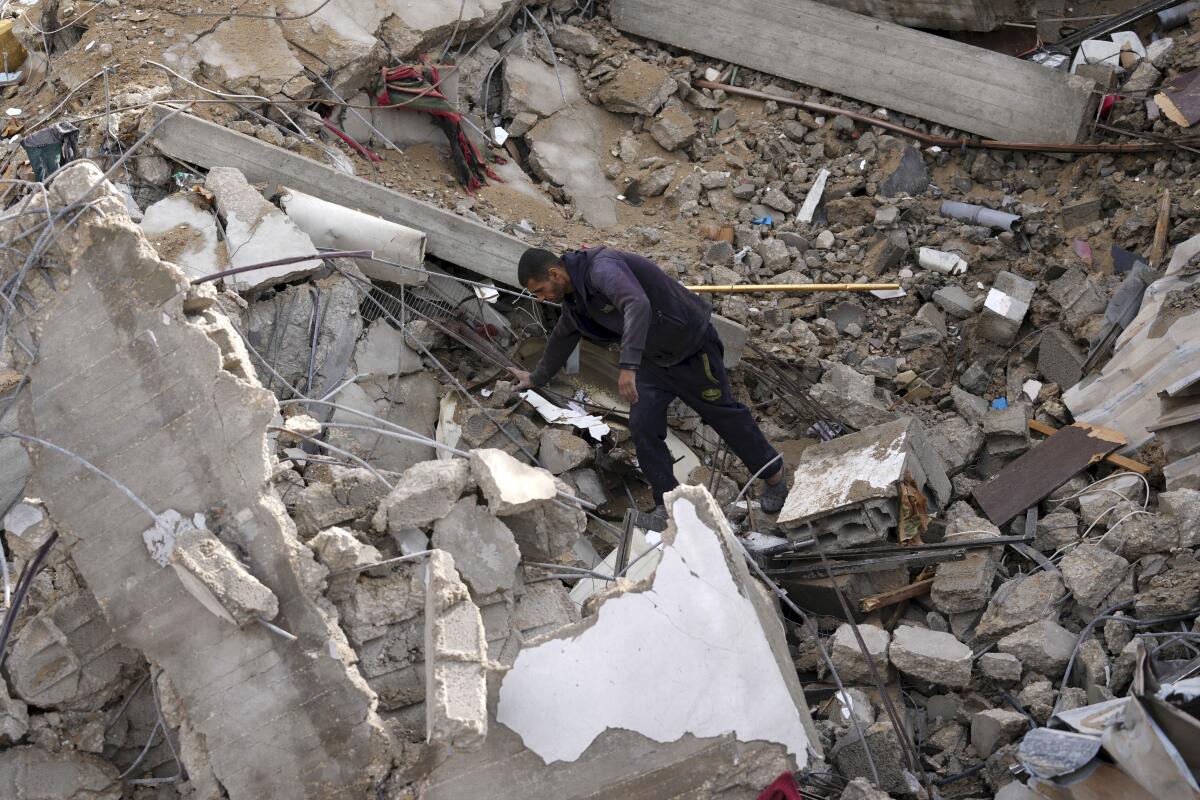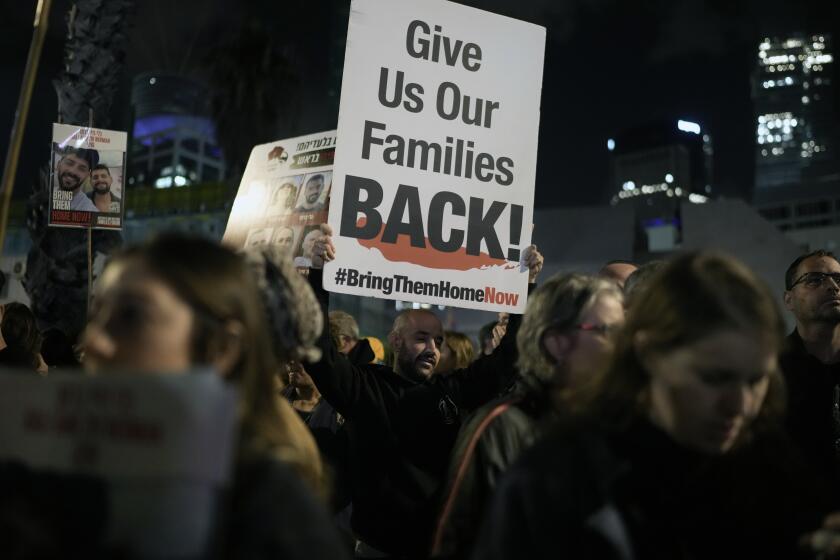U.S. says ‘it’s the right time’ for Israel to scale back Gaza war as fighting hits 100 days

- Share via
JERUSALEM — The White House said Sunday that “it’s the right time” for Israel to scale back its military offensive in the Gaza Strip, as Israeli leaders again vowed to press ahead with their operation against the territory’s ruling Hamas militant group.
The comments exposed the growing differences between the close allies on the 100th day of the war.
Also Sunday, Israeli warplanes struck targets in Lebanon after a Hezbollah missile attack that killed two Israeli civilians — an older woman and her adult son — in northern Israel. The exchange of fire underscored concerns that the Gaza violence could trigger wider fighting across the region.
The war in Gaza, launched by Israel in response to the unprecedented Oct. 7 attack by Hamas, has killed nearly 24,000 Palestinians, devastated vast swaths of Gaza, driven about 85% of the territory’s 2.3 million residents from their homes and pushed a quarter of the population into starvation. In the October attack in southern Israel, the militants killed some 1,200 people, mostly civilians, and took about 240 hostages, around half of whom remain in captivity.
Speaking on CBS, White House National Security Council spokesman John F. Kirby said the U.S. has been speaking to Israel “about a transition to low-intensity operations” in Gaza.
“We believe it’s the right time for that transition. And we’re talking to them about doing that,” he said on “Face the Nation.”
Tensions have soared across the region, with Israel trading fire almost daily with Lebanon’s Hezbollah militant group, Iran-backed militias attacking U.S. targets in Syria and Iraq, and Yemen’s Houthi rebels targeting international shipping, drawing a wave of U.S. airstrikes last week.
Families of hostages held in Gaza for 100 days hold 24-hour rally, beg government to bring them home
Thousands of protesters have poured into a square in downtown Tel Aviv, beginning a 24-hour rally to draw attention to 132 hostages still held by Hamas in the Gaza Strip
Sunday’s missile strike came a day after the Israeli army said it killed three militants who had crossed into Israel from Lebanon and attempted to carry out an attack.
“It’s been 100 days, yet we will not stop until we win,” Defense Minister Yoav Gallant said Sunday.
In recent weeks, Israel has scaled back operations in northern Gaza, the initial target of the offensive, where weeks of airstrikes and ground operations left entire neighborhoods in ruins.
Kirby acknowledged that Israel had taken some “precursory steps” toward scaling back the offensive. But he said there was more to do.
“We’re not saying let your foot up off the gas completely and don’t keep going after Hamas,” he said. “It’s just that we believe the time is coming here very, very soon for a transition to this lower intensity phase.”
Hezbollah’s leader, Hassan Nasrallah, said his group won’t stop until a cease-fire is in place for Gaza.
“We are continuing, and our front is inflicting losses on the enemy and putting pressure on displaced people,” Nasrallah said in a speech, referring to the tens of thousands of Israelis who have fled northern border areas.
The unprecedented level of death and destruction in Gaza has led South Africa to lodge allegations of genocide against Israel at the International Court of Justice. Israel adamantly denies the accusations and has vowed to press ahead with its offensive even if the court in The Hague issues an interim order for it to stop.
“No one will stop us, not The Hague, not the axis of evil and not anyone else,” Israeli Prime Minister Benjamin Netanyahu said Saturday evening, referring to Iran and its allied militias.
Israel has also vowed to return the more than 100 hostages still held in Gaza as its leaders have faced mounting protests from their families, including a 24-hour rally in Tel Aviv that began Saturday evening and drew tens of thousands of supporters.
Israeli forces have managed to rescue only one hostage, and mistakenly killed three last month, while more than 100 were released during a weeklong cease-fire in November in exchange for 240 Palestinians imprisoned by Israel. Hamas says no more hostages will be released until Israel ends its offensive.
Israel and Hezbollah have been careful not to allow their back-and-forth fighting to erupt into full-blown war on a second front.
But they have come close on several occasions — most recently in the aftermath of an airstrike that killed a top Hamas official in Beirut on Jan. 2. Hamas and Hezbollah have both blamed Israel for the strike. The latest attacks on Israel, including the deaths of two civilians on Sunday, raised the likelihood of new Israeli reprisals.
The missile hit a home in the town of Yuval in northern Israel, killing a man in his 40s and his mother, who was in her 70s, Israeli rescuers said.
Although Yuval is one of more than 40 towns along the northern border evacuated by the government in October, Israeli media reported that the family stayed in the area because they work in agriculture.
Late Sunday, the Israeli military said it had carried out a series of strikes on Hezbollah targets in Lebanon.
The army’s chief spokesman, Rear Adm. Daniel Hagari, said Israel would not tolerate attacks on civilians.
“The price will be extracted not just tonight, but also in the future,” Hagari said.
More than 115,000 Israelis have evacuated from northern Israel because of the ongoing tensions. In Israel, 12 soldiers and seven civilians have died from rocket launches from Lebanon, and more than 170 were injured. Hezbollah has reported that at least 150 fighters and 20 civilians have been killed in the near-daily exchanges of fire.
The deadly strike came hours after the army said it killed three militants who entered a disputed Israeli-controlled enclave in the Golan Heights.
A group called Islamic Glory Brigades claimed responsibility for the infiltration. The Associated Press could not independently verify the statement, and Hezbollah, the Lebanese branches of Hamas and the Palestinian Islamic Jihad all said the group was not affiliated with them.
Since October, more than 2,000 rockets and 350 drones have been launched from Lebanon, according to Israel.
Tensions have also spread to the Israeli-occupied West Bank, where Palestinian health officials say nearly 350 Palestinians have been killed in Israeli military raids and other violent confrontations throughout the war.
On Sunday, the Israeli army said troops opened fire after a Palestinian car breached a military roadblock in the southern West Bank and an attacker fired at soldiers. Palestinian health officials said two Palestinians were killed.
Israel has also been under growing international pressure to end the war in Gaza, but has so far been shielded by U.S. diplomatic and military support. Israel argues that any cease-fire would hand victory to Hamas, which has ruled Gaza since 2007 and is bent on Israel’s destruction.
Thousands took to the streets of Washington, London, Paris, Rome, Milan and Dublin on Saturday to demand an end to the war. Protesters converging on the White House held aloft signs criticizing President Biden’s unwavering support for Israel.
In recent weeks, Israel has scaled back operations in northern Gaza, the initial target of the offensive, where weeks of airstrikes and ground operations left entire neighborhoods in ruins. Netanyahu said there are no immediate plans to allow hundreds of thousands of Palestinians to return to their homes there, after U.S. Secretary of State Antony J. Blinken raised the issue during a visit to the region last week.
Israel has meanwhile launched major operations against the southern city of Khan Yunis and built-up refugee camps in central Gaza.
“No one is able to move,” said Rami Abu Matouq, who lives in the Maghzai camp. “Warplanes, snipers and gunfire are everywhere.” He said several buildings have been hit by airstrikes and shelling over the last two days but no one can reach them to try to rescue any survivors.
Netanyahu said Israel would eventually need to push farther south and take control of Gaza’s border with Egypt, which Israeli officials say is still used by Hamas to smuggle in arms.
Egypt, which in recent years has fortified the border, demolished tunnels and established a buffer zone, insists that it has full control of the border and says any such operation would have to be considered in light of agreements reached with Israel and the United States.
The area in and around the border town of Rafah is also packed with hundreds of thousands of Palestinians who fled other parts of Gaza and are crowded into overflowing U.N.-run shelters and tent camps.
Meanwhile, the Egyptian TV station Al Ghad said a cameraman was killed in an Israeli airstrike in northern Gaza. The channel said Yazan Zwaidi was apparently in a crowd of people at the time. Details were not immediately available, and the Israeli military had no comment.
The internet advocacy group Netblocks said communications in Gaza were still unavailable after a 48-hour outage. The Palestinian telecommunications operator in Gaza, Jawwal, said two of its employees were killed Saturday when they were hit by a shell while fixing lines in Khan Yunis.
The Gaza Health Ministry said Sunday that hospitals had received 125 bodies in the last 24 hours, bringing the overall death toll to 23,968. The Hamas-run ministry does not differentiate between civilians and combatants but says about two-thirds of the dead are women and minors. It says more than 60,000 people have been wounded.
Fewer than half of the territory’s 36 hospitals are still partially functional, according to the U.N. humanitarian office. It says the widespread fighting and Israeli restrictions have made it increasingly difficult to deliver food, water and other desperately needed aid. U.S. pressure on Israel to facilitate deliveries has met with little success.
Israel says Hamas is responsible for the high civilian casualties, saying its fighters make use of civilian buildings and launch attacks from densely populated urban areas. The military says 188 soldiers have been killed and 1,099 wounded since the start of the ground offensive.
More to Read
Sign up for Essential California
The most important California stories and recommendations in your inbox every morning.
You may occasionally receive promotional content from the Los Angeles Times.











